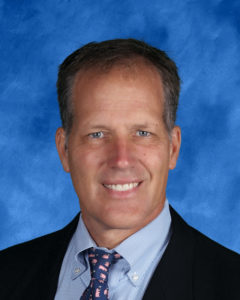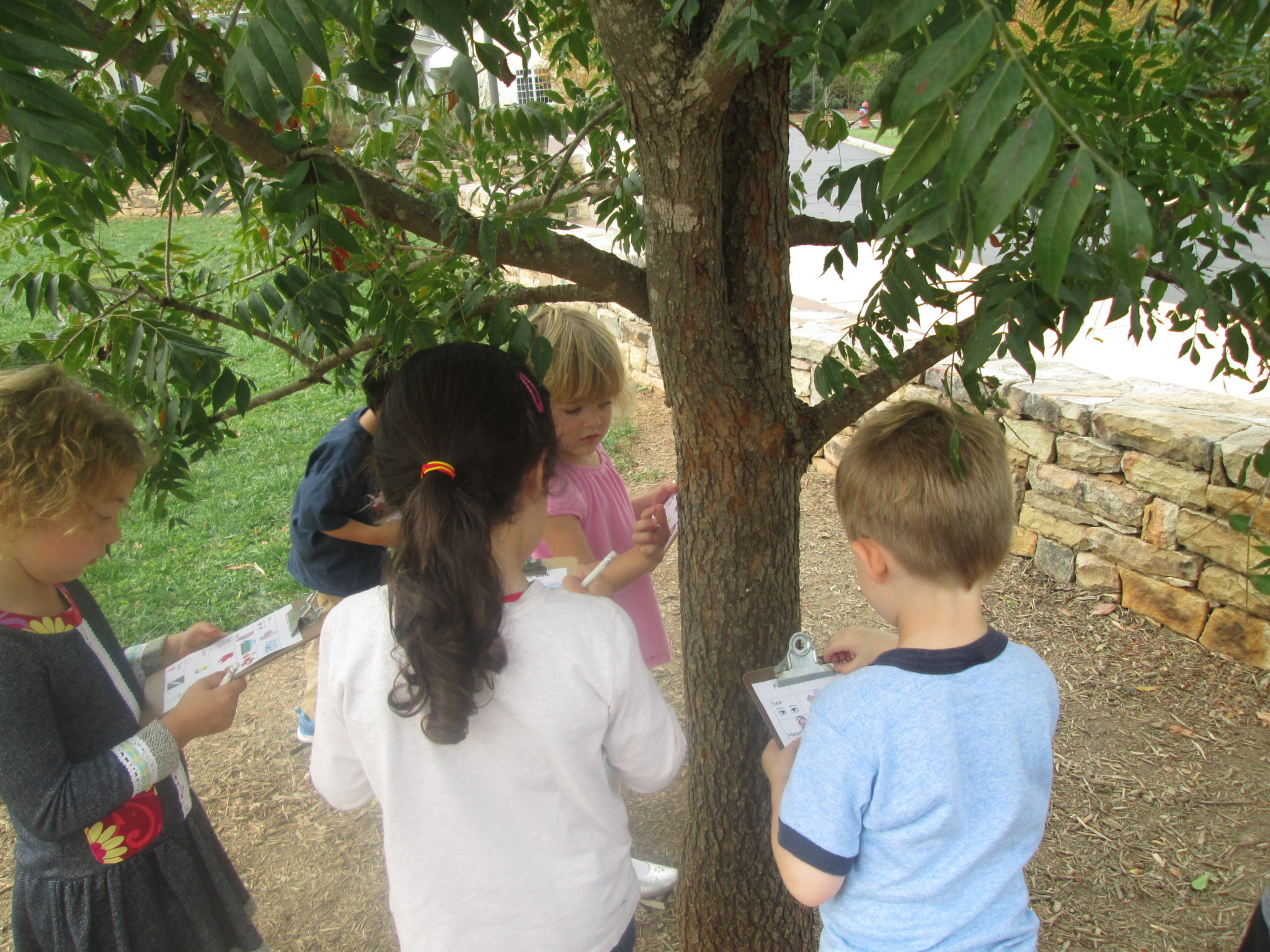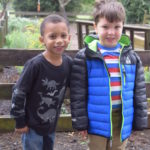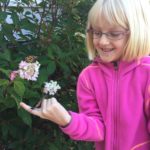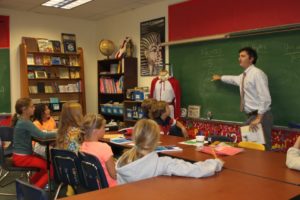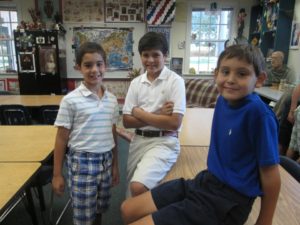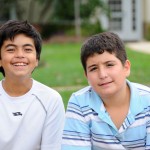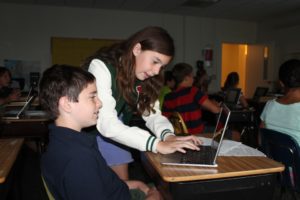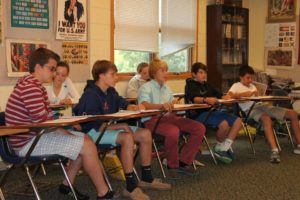Building a Strong Foundation
The best way to learn about the program at Hill is to talk to us and visit. If you would like to learn more we hope you will contact us, either through email or by calling the school to set up an appointment. We are proud of our program and eager to discuss it with you.
Building a Strong Foundation
Hill School’s academic program is focused on building a strong foundation of core academic skills through a curriculum that challenges each student at an appropriate level of skill and developmental readiness. Within disciplines, significant themes and common practices unify the scope and sequence of our program. Please feel free to browse the curriculum summaries for each grade level for a more detailed description of course offerings.
In the language arts, students in all grades read independently, which encourages fluency and a life-long love of reading. Students master writing skills and processes through frequent practice that emphasizes the development of each writer’s voice. Understanding of the conventions of standard written English is built through conferences with teachers and peers as well as detailed comments and responses. The student publications Calliope and Curves, Angles, Dots allow children to write for the larger school community.
Math groups are small and focus on building a solid structure of understanding that makes future learning possible. The mathematics curriculum incorporates six content strands: numbers and operations, measurement, data analysis, probability, geometry, and algebra (patterns, functions, and symbolic representation). In addition to procedural fluency, emphasis is placed on problem solving, reasoning and proof, communication, connections, and representation.
Social studies and history classes introduce students to the people, culture, and world around them. Starting with an exploration of Middleburg’s place and culture, the curriculum branches out to a variety of times and places. From Sumer to Native Americans, and from classical Greece to United States history, students gain an understanding of how people have related to one another and responded to their environments. Students learn geography, note-taking, test preparation, and working with textbooks and original sources and they take frequent field trips to many sites including Washington D.C., Colonial Williamsburg, and New York City.
Hill School has a strong JK-8 science program developed and taught by three experienced science teachers. The curriculum, aligned with the National Science Teachers Association Standards of Learning, blends topics from the life, earth, and physical sciences. Scientific literacy is developed through active inquiry, problem solving, and decision making. Students are encouraged to explore, investigate, and question, which develops their curiosity about the world around them. Scientific concepts such as hypothesis, prediction, and conclusion are incorporated throughout the program and include more formal lab write-ups in the upper grades. Students solve problems through firsthand experiences and by observing and examining their environment. In order for students to develop scientific literacy, concrete experience is of utmost importance – in fact, it is essential.
In addition to our JK-8 science curriculum emphasizing hands-on learning, Hill School incorporates place-based outdoor field studies – our Dornin Science Center units. This unique program gives children the opportunity to use scientific field methodology to monitor, interact with, and connect to their environment, which fosters responsible stewardship. Field studies include forest surveys, water quality monitoring using chemical tests and invertebrate surveys, soil testing and soil amendment, growing food, bluebird box construction and observation, colonial gardening, and many other outdoor activities. Most of these programs take place on our beautiful 137 acre campus, which includes a variety of habitats and open spaces.
Throughout the curriculum, teachers keep close watch on students who require additional academic support. In the lower grades, homeroom teachers coordinate with the Reading Specialist and other support personnel so that students receive support both individually and in small groups. In the upper school, Academic Support is a separate class in which students learn study skills while working on core academic classes. In addition, many teachers at Hill tutor students and work with them daily to help with organization or specific assignments. Academic Support teachers meet weekly to monitor student progress and make adjustments as necessary.
The best way to learn about the program at Hill is to talk to us and visit. If you would like to learn more I hope you will contact me, either through email or by calling the school to set up an appointment. I am proud of our program and will be eager to discuss it with you.
Huntington Lyman, Ph.D.
Academic Dean
In Junior Kindergarten, a child’s play is his or her work. The program focuses on providing a meaningful, engaging, and joyful learning experience while meeting the individual developmental needs of each child.
Junior Kindergarten (JK) focuses on each child’s healthy development in a variety of areas. Children learn socialization skills by interacting with each other while supervised and guided by caring and experienced teachers. The program helps children develop physical awareness and grow emotionally, so that they build skills and understandings of their bodies, hearts, and minds. These experiences, we believe, are the best ways to prepare children for later academic work.
A child in the JK program has a variety of experiences every day. Language is developed through talking and listening as we share memories, stories, and books. Children learn through active engagement in sensory experience and by using manipulative learning materials. Each week students take classes outside of the homeroom, taking advantage of Hill School’s facilities and teachers to go to sports, library, and music. In all classes, each child’s creativity and ideas are nurtured. Our ultimate goal is to build a solid foundation for each child by creating a strong sense of community and security where self-confidence, independence, and growth of individual strengths are encouraged.
The math program incorporates a variety of hands on experiences and manipulatives to encourage exploration of age appropriate math concepts. Learning number rhymes, songs, and counting are typical activities that encourage children to understand that math is part of their everyday world. Throughout the year, children continue to explore the concepts of sequencing, graphing, patterning, measurement, quantity, and shapes.
Learning experiences are tied to themes that are woven into the program throughout the year. Themes include: All about Me; Families; Friendship, Kindness, and Sharing; Apples and Pumpkins of Fall; Nursery Rhymes; Holidays; Winter Animals; Kings, Queens, and Castles; Valentines and Love; Spring, Plants, and Insects; Honesty and Trustworthiness; and Pets and Zoo Animals. Topics are adjusted appropriately to suit the interests of the group.
JK children also enjoy a variety of field trips and special events, including nature hikes in each season and trips to an apple orchard, pumpkin patch, and a Christmas tree farm. When appropriate, JK children also participate in Hill School events such as the Halloween Parade, the celebration of 100 days of school, Culture Study, Grandparents and Special Friends Day, and school plays. The JK and Kindergarten children also gather for special activities and perform a play together in the spring.
Language Arts
In our Language Arts, program reading, writing, and spelling go hand in hand. Kindergarten provides a language-rich environment of stories, poems, rhymes, and songs. The children hear and read various books every day. Some stories are by a featured author, some are based on our unit of study (fiction and non-fiction), some are children’s favorites, and some are just right for a Kindergartner’s sense of humor. Reading is introduced using a combination of approaches, including sight words and phonics. Children participate in guided reading, and as the year progresses, they take part in a Reading Workshop where they are given time to practice reading books that are on their developmental level. Teachers listen to the readers and focus on the individual needs of the child. Students develop confidence as readers through this process and are eager to share their new-found skills. They have opportunities to read to their classmates as well as to book buddies in other grades.
Writing workshop begins with students drawing pictures about their experiences or a teacher directed topic. Children dictate their stories to a teacher or write them, using their own “Kindergarten Spelling.” As the year progresses, they move through various stages of spelling. The students take great pride in their work and enjoy sharing their stories with classmates. Some stories are typed and displayed in the hallway.
Penmanship and number formation are introduced using the program Handwriting Without Tears. Children learn to form their letters and numbers correctly and practice the skills.
Mathematics
The math curriculum follows the Investigations series which is sequential and developmentally appropriate, meeting a wide range of learners. Children in kindergarten develop early math skills by being actively involved in the use of manipulatives, by sharing their ideas and thought processes with peers and teachers, and by solving mathematical problems in ways that make sense to them. The areas of instruction include number and operations (addition and subtraction), patterns and functions, data analysis, 2D and 3D geometry, and measurement. The children use a variety of games and materials in whole group, in small groups, in pairs, or individually to discover the world of mathematics.
Social Studies
The Social Studies program draws from the children’s experiences. Through discussion, role playing, stories, art activities, and field trips, children expand their knowledge and understanding of their world. Topics include: school and friends, our community, Thanksgiving – The Wamponoag Indians, Culture Study program, and holidays.
Science
Science builds on children’s natural curiosity and motivates early interest through active learning. Our science units include a variety of activities ranging from arts and crafts projects, models, games, to observation and experiments. Through hands-on experiences children develop thinking skills: predicting, measuring, comparing, classifying, and drawing conclusions.
Art
Art is incorporated into the curriculum every day to develop the students’ creativity, for their enjoyment, to teach them to follow multi-steps directions, and to strengthen their small motor skills. Children use a variety of materials such as paint, clay, fabric, crayons, and markers in both self and teacher-directed activities.
Music
In addition to participating in many musical activities in the Kindergarten classroom under the supervision of the Kindergarten teachers, the children meet once a week with the music teacher in the music room for a half-hour period of singing, rhythm games, and songs with movement. Orff xylophones and other small percussion instruments are used both alone and as accompaniment to songs and rhymes. The children perform at the Thanksgiving Assembly, the Holiday Concert, and the Spring Sing Concert.
Sports
The athletic department helps children develop positive habits of lifelong fitness and the desire to achieve their personal best in all endeavors. To achieve this, every child participates and competes in a variety of team and individual activities that promote sportsmanship, confidence, and competence in a physically and emotionally safe environment.
Language Arts
The components of our Language Arts program are intertwined and designed to build critical thinking skills as well as nurture a love of reading and writing. Reading Workshop provides children the chance to explore the world of print, make sense of it, and develop the habits of lifelong readers. The time is balanced between whole class lessons, small group work, individual practice, and buddy reading with classmates. In Writing Workshop children learn the craft of writing and grow as authors. Mini-lessons bring the children together as a community of authors and help them explore the characteristics of good writing. Word Study blends phonemic awareness, phonics, and spelling patterns. Instruction is based on where the child is developmentally. We use the Handwriting Without Tears program for formal Handwriting instruction.
Mathematics
The Investigations program provides a sequenced, developmentally appropriate math curriculum. Underlying fundamental concepts as well as computational skills are given equal importance. The children are encouraged to explore many ways to solve problems. They use blocks, cubes, shapes, and many other objects to visualize concepts. Then they try out different ways to represent their thinking on paper such as drawing pictures, using numbers and symbols, drawing a number line, and using words. The children share their techniques with each other and the teacher guides them toward finding efficient strategies. Many different games are played with the purpose of deepening concepts and building fluency with basic addition and subtraction facts. Math class is active, full of talk, sharing, trying new strategies, and learning how to represent ideas on paper.
Social Studies
The concepts of community and symbolism are integrated throughout the year. The children study some of the presidents of the United States, Virginia, mapping skills, and transportation. Our Community Service project is kicked-off by studying Martin Luther King Jr. in January and heeding the call to service that that federal holiday is beginning to embody. The children advertise, bake and sell a yummy treat, shop at the local grocery store with the proceeds and then stock a food pantry’s shelves. The study of pollinators is part of the Stewardship Initiative. The children raise and tag monarchs in the fall and learn about honeybees, native bees, and butterflies. They plant a pollinator garden next to the classroom. Social Studies also includes the yearly Culture Study when the whole school engages in learning about a different country.
Science
Our curriculum includes an environmental science element with the homeroom teachers that focuses on the study of pollinators and care for the gardens directly outside the classroom. The study of bees and butterflies (and many other insects) is year-long and woven throughout all subject areas. Working directly with the science teacher, homeroom teachers emphasize generating curiosity through activities and cooperative projects. Beginning experimentation, making observations, and collecting data are introduced. The curriculum includes: the needs of living things, body systems, nutrition, the five senses, daily and seasonal cycles and life cycles, recycling and characteristics of different materials, and Dornin Science Center units on recycling paper and planting a pollinator garden.
Spanish
Students are introduced to the Spanish language through small group activities, songs, and games. Lessons revolve around hearing the Spanish language. Basic vocabulary includes salutations, manners, colors, numbers, parts of the body, and animals. The Spanish program culminates in the spring in an all-school assembly.
Art
The emphasis is on generating enthusiasm and enjoyment of the creative process, while developing basic art making skills. Students are exposed to a variety of materials and techniques throughout the year. Understanding basic design skills are included in each project while exploring art history, children’s literature, and a variety of cultures around the world.
Music
Activities include singing, rhythm games and movement. Orff xylophones and other small percussion instruments are played with songs, clapping games, and rhymes. Emphasis is placed on the child establishing a steady beat, learning songs and rhythms by rote, and learning patterns on the xylophones. The children perform at the Thanksgiving Assembly, the Holiday Concert, and the Spring Sing concert.
Sports
The athletic department helps children develop positive habits of lifelong fitness and the desire to achieve their personal best in all endeavors. To achieve this, every child participates and competes in a variety of team and individual activities that promote sportsmanship, confidence, and competence in a physically and emotionally safe environment.
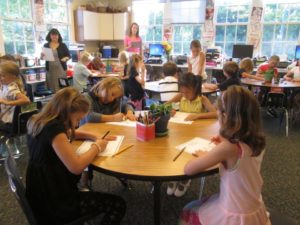
Language Arts
The components of our Language Arts program are synergistic and designed to build good habits and foster a love of reading and writing. The students participate in Writing Workshop for sixty minutes, four days per week. The students are given ample time to learn the art of writing through learning various genres: small moments, opinions, letters and speeches, realistic fiction, fairy tales, non-fiction, and poetry. Reading Workshop includes meaningful experiences and methods of cooperative learning that include read-alouds, mini-lessons, meaningful conversations, buddy reading, guided reading groups, literature circles, and readers’ theatre. The Word Study program is based on the Wilson Foundation system of phonemic awareness, fluency, spelling, and sound mastery. Students are engaged through explicit, systematic, and multi sensory instruction based on individual needs.
Mathematics
The curriculum follows the Investigation in Numbers, Data, and Space series which engages the range of learners in understanding and reasoning about mathematical ideas. Our substantive work, taught with manipulatives through activities, games and workbooks, includes areas of study in : numeration; addition, subtraction and the number system; 2D and 3D geometry; patterns, functions and change; measurement; fractions; and data analysis.
Social Studies
The Social Studies program focuses on our immediate environment. Students learn about our school, our local community, and our bird sanctuary. Students care for the birds by creating bird watching areas, feeding the birds, and creating suet recipes. The curriculum emphasizes learning as teachers introduce research techniques and methods to show students how to gather and organize information about birds and create an identification guide. Students conduct independent research through reading, Internet sources, and observation, and they present information they discover both orally and in writing. Students also interview a variety of adults in our community to learn about their vocations, the challenges they face, and their role in the community. Students will also learn about their families and friends, and the greater world, as we read Flat Stanley and create life size Flat Me’s.
Teambuilding
The Teambuilding class meets weekly in small groups, providing opportunities to learn about teamwork and how each individual can help create a cohesive group. The lessons, taught through literature, emphasize kind and respectful interaction, doing one’s personal best, and learning to help others.
Science
The emphasis is on generating curiosity through activities and cooperative projects. Conducting experiments, making observations and collecting data are also stressed. The curriculum includes: a study of waterfowl and wetlands at the Dornin Science Center, growth and changes in animals, properties of liquids and solids, energy from wind and moving water, and movement of air and water in the environment.
Spanish
Students continue their introduction to the Spanish language through an interactive system approach. Lessons revolve around using Spanish: basic vocabulary including salutations, colors, numbers, classroom and household words, food, and other common vocabulary. The year culminates in a Spanish play based on what the students have learned throughout the year.
Art
The emphasis is on generating enthusiasm and enjoyment of the creative process, while developing basic art making skills. Students are exposed to a variety of materials and techniques throughout the year. Understanding basic design skills are included in each project while exploring art history, children’s literature, and a variety of cultures around the world.
Music
Activities include singing, speaking in rhythm, clapping patterns, and movement games. The focus is on maintaining a steady beat and striving for the addition of another task (i.e. singing and clapping, singing and playing a xylophone pattern, or clapping and speaking a separate rhythm). The children perform at the Thanksgiving Assembly, the Holiday Concert, and the Spring Sing concert.
Sports
The athletic department helps children develop positive habits of lifelong fitness and the desire to achieve their personal best in all endeavors. To achieve this, every child participates and competes in a variety of team and individual activities that promote sportsmanship, confidence, and competence in a physically and emotionally safe environment.
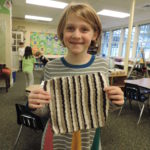
Language Arts
The components of our Language Arts program are designed to build good habits and foster a love of reading and writing. The students participate in Writing Workshop and explore a variety of genres, including personal narrative, realistic fiction, informational writing, poetry, historical fiction, drama, and biography. Students learn to edit for punctuation, capitalization, and complete sentences, and to revise their work through conferences with classmates and teachers. Students have many opportunities to share their work as they progress. Reading Workshop includes daily independent reading and frequent conferences with teachers at the student’s reading level. Students take Accelerated Reader quizzes, a program designed to monitor reading comprehension. Additionally, students are responsible for reading at least thirty minutes each night, keeping a log, and returning that log to school each day. The Spelling program has students work in groups to study word patterns each week. Words are practiced each day through exercises such as word sorts and games, and a spelling quiz is given each Friday. Students also study and work toward mastery of a list of high frequency words. Students are responsible for a weekly list of words which is composed of one spelling principle and also includes words taken from their individual writing. The Penmanship program utilizes Handwriting without Tears, to develop a mastery of cursive letters. Exercises to develop hand and finger strength are often included.
Mathematics
Students explore concepts in mathematics using the curriculum Investigations in Number, Data, and Space. Through a sequence of units, each designed to accommodate a range of learners, they build their understanding of numeration and place value; arithmetic, including addition, subtraction, multiplication, and division; 2D and 3D geometry, patterns, functions, and change; measurement; fractions; and data analysis. Math workshop begins when the children arrive in the morning, and includes whole class mini-lessons, small group instruction, and individual practice.
Social Studies
During the fall, students learn about how the environment influenced the lives of Native American Indians in different areas in North America. During each unit of study they discuss literature, conduct research, complete projects, and write about what they are learning. During the winter, students explore their own heritage and conduct a family history research project. Students visit the Frontier Culture Museum, Jamestown, and take an overnight trip to Williamsburg. After the trip to Williamsburg, students create presentations for our Living Wax Museum about colonial topics that interest them.
Science
The emphasis in 3rd grade Science is on generating curiosity through activities and cooperative projects. The curriculum includes the study of growth and changes in plants, materials and structures, forces that attract and repel, a Paleobotany unit, and a Colonial Gardening unit at the Dornin Science Center. Students conduct experiments, make observations, and collect data.
Spanish
Students will continue their introduction to the Spanish language twice a week in the afternoons in small groups. Lessons will include hearing and speaking the language, reading familiar children’s books, basic vocabulary including salutations, colors, numbers 1-100, animals, parts of the body, the calendar, the weather and seasons, food, classroom words, and other common vocabulary. Students will use a variety of activities, worksheets, and tools to help facilitate their learning. The Spanish program culminates in the spring in an all-school assembly. Students will perform a small play depicting much of what they have learned throughout the year.
Computer
Students are introduced to computer concepts and terms. They begin basic keyboarding skills, and are introduced to word processing, internet usage, and PowerPoint. Computers also support the curriculum in math, word study, and social studies through guided research and some games. By the end of the year, students are typing their own writing.
Art
The goals of the art department are to teach the basic elements of design in two and three-dimensional projects through line, shape, size, texture, color, and value. Students are exposed to a variety of media and techniques in an effort to stimulate and encourage creative development and confidence. Teachers work together to reinforce topics taught in literature, social studies, and science.
Music and Strings
Activities include singing with an eye toward proper tone quality, learning rhythmic patterns on sticks and xylophones, and working with the soprano recorder in the second half of the year. Written musical symbols are introduced as the students learn to find their part on a choral score. Individual vocal and instrumental improvisation within a specific musical structure is explored. Every student also has a strings lesson on a violin, viola or cello, and a practice session. The class performs at the Thanksgiving Assembly, the Holiday Concert, and the Spring Sing Concert.
Theater
Students meet once a week with the Theater Program Director to learn the basic tools essential for performing and understanding theatre. This introductory year builds on familiarity students might have with plays for films, and focuses on how to work together toward shared artistic goals. Individually and in small groups, students use exercises and techniques such as pantomime, story drama, and improvisation to create believable characters in their fictional worlds. Emphasis is also placed on listening skills, following direction, memorization, and the student gaining the self-confidence to express themselves through art. The year culminates with a community sharing that showcases skills learned through dramatic activities and exercises as well as student-generated characters, monologues, and original scene work.
Sports
The athletic department helps children develop positive habits of lifelong fitness and the desire to achieve their personal best in all endeavors. To achieve this, every child participates and competes in a variety of team and individual activities that promote sportsmanship, confidence, and competence in a physically and emotionally safe environment. Students play “lead up games” and focus on skills related to soccer, basketball, gymnastics, volleyball, and track & field.
Language Arts
The components of our Language Arts program are synergistic and designed to build good habits and foster a love of reading and writing. The students participate in Writing Workshop and work on fictional pieces, as well as non-fiction writing, particularly personal experience narratives. Proofreading and revision are vital components of each assignment. Throughout the year, we work on proofreading skills through the presentation of mini-lessons and participation in “rotten writing” exercises. Completing “polished” pieces for submission to the school’s student writing publications, Curves, Angles, and Dots and Calliope, is also a major component of the course. Reading Workshop exposes students to a variety of literature. The goal of this format is to develop and support readers who find a place for reading in their lives and enjoy reading and its challenges. Through Reading Workshop, students develop into proficient and sophisticated readers who understand that reading is a process of making meaning within the text. Students are required to read nightly and keep a daily reading log. The Accelerated Reader Program is used to monitor the children’s independent reading.
Mathematics
Developing a solid set of procedural math skills is vital for all students. We believe that it is vital to encourage and help all students to become thinkers! All math classes provide an environment that encourages hypothesizing and testing of ideas for validity. The curriculum will follow that of Investigations in Number, Data, and Space. It is designed to support students as mathematical thinkers. While the course emphasizes computational fluency with whole numbers, it also includes substantive explorations with rational numbers, geometry, measurement, data analysis, and early algebra. The students are encouraged to build upon the mathematical ideas they already know to solve new problems. The class is structured to allow them the opportunity to collaborate, to share their ideas, and to describe (verbally and in writing) their thought processes.
History and Geography
The history program consists of an in-depth study of ancient Mesopotamia, Egypt, and Greece. We discuss the requisite characteristics common in all civilizations and compare and contrast these features in the cultures we are studying. Students learn how the environment and resources of each civilization shaped its culture. We emphasize learning through the study of intriguing historical figures: kings, pharaohs, heroes, politicians, etc. We also study the mythology of each civilization. Students learn about the daily life and customs of each society, and we discuss the legacies that each civilization has left behind. For each unit, we read an accompanying work of literature, such as Gilgamesh, the Hero when studying Mesopotamia, and we will also study maps of these areas. The spring unit, Ancient Greece, provides a historical and conceptual framework for the transition into the fifth grade’s study of Greek mythology.
Science
The emphasis is on generating curiosity through cooperative activities, making observations, conducting experiments and collecting data. Topics include: rocks, minerals, fossils and erosion; materials that transmit, reflect, or absorb light and/or sound; light and sound energy; pulleys and gears; habitats and communities. The Dornin Science Center is used to study units on soil and organic gardening.
Language Fundamentals
The curriculum for Language Fundamentals has four main components: 1) the study of Latin word roots – we study one word root and its derivatives each week. By the end of the 5th grade, students will know approximately 100 Latin word roots. 2) Fundamental grammatical concepts, including the parts of speech. 3) Discussions and classroom activities pertaining to language exploration, including the creation and evolution of languages, how and why we communicate, the relationship between language and culture, and the value of learning other languages, and 4) Two projects: one creating an original alphabet and the other a research project of a foreign language and culture.
Technology and Research
The curriculum for Technology and Research has several main units: Design Thinking, Coding & Algorithms, The 20% Project, and Entrepreneurship. Students will work on projects designed to develop problem solving, critical thinking, collaboration, research, and presentation skills. These elements make up a “toolkit” of skills that students will use in the ever complex life and work environments of the twenty-first century.
Art
The art program teaches students to interpret and understand the world from the artist’s point of view. Students learn to recognize and use the concepts of design and composition which are the building blocks of art. We strongly encourage experimentation. Art is integrated into many aspects of school life, supporting the Science, English, and History programs with interdisciplinary projects. Student work is always on display around the school and in the art building. The art department presents an art show each spring in which every student is represented. Our goal is for students to create work which expresses their individuality by providing them with the necessary technical skills and with the opportunities to experiment and invent.
Music and Strings
The students work on choral tone and learning to sing in both unison and two parts. Written music symbols continue to be explored as they play recorder, strings and Orff xylophones. Emphasis is placed on building self-confidence and encouraging mastery of the pieces taught with an eye to successful performance. Ensemble building activities are introduced as necessary. Strings are taught concurrently with general music and in an additional time on Thursday. The class performs at the Thanksgiving Assembly, the Holiday Concert, the Spring Sing Concert, and at Graduation.
Sports
The athletic department helps children develop positive habits of lifelong fitness and the desire to achieve their personal best in all endeavors. To achieve this, every child participates and competes in a variety of team and individual activities that promote sportsmanship, confidence, and competence in a physically and emotionally safe environment. Basic skills, teamwork, and conditioning are emphasized. Students participate in soccer, cross country running, basketball, gymnastics, track & field, lacrosse, and other games. Additionally, students participate in interscholastic competition and intramural green-white games.
Theater
Each year the 4th grade will come together as a class to rehearse and perform a play. The students will hold two performances – one during an all-school assembly and one in the evening. During the rehearsals, students will work on improvisation exercises, script analysis, and creating characters.
Literature
The goal of the Literature program is to foster and develop an enjoyment of reading and to strengthen each student’s vocabulary, comprehension, and fluency. Material for class units will be strongly linked to the history and scholars curriculum. Students will be reading “young adult” versions of classic literature including books by Homer, Chaucer, Shakespeare, and Victor Hugo. In addition, students are expected to read as least 30 minutes each night and 2 hours on the weekends for their Independent Reading. Book Report projects are assigned each trimester.
Writing Workshop
The goals of this course are to build an enthusiasm for writing, teach writing mechanics and proofreading, increase fluency, and give students a place to discuss their writing. Students will be exposed to a variety of genres: narrative, essays, fiction, and poetry. The class emphasizes the process of writing, including drafting and conferencing with other students.
Mathematics
Developing a solid set of procedural math skills is vital for all students. We believe that it is vital to encourage and help all students to become thinkers! All math classes provide an environment that encourages hypothesizing and testing of ideas for validity. The curriculum follows Investigations in Number, Data, and Space. It is designed to support students as mathematical thinkers. While the course emphasizes computational fluency with whole numbers, it also includes substantive explorations with rational numbers, geometry, measurement, data analysis, and early algebra. The students are encouraged to build upon the mathematical ideas they already know to solve new problems. The class is structured to allow them the opportunity to collaborate, to share their ideas, and to describe (verbally and in writing) their thought processes.
History
Students begin the year with a study of Roman engineering. Focus then shifts to the Medieval period in Europe with a focus on castles and knights. We conclude the year with a study of Renaissance art. The History curriculum shares a strong thematic unity with the Literature, Writing, Science, and Art programs. Joint ventures include: Roman/Greek mythology, castle building, and a Renaissance project.
Scholars
To further enhance the literature and history curricula, students participate in a year-long “scholars” class. The focus of the fall trimester will be architecture. During the winter and spring terms our attention will be on Greek and Norse mythology. The spring trimester study focuses on the history, architecture, art, and culture of New York City to prepare students for the class trip to Manhattan.
Science
The emphasis is on generating curiosity through cooperative activities, making observations, conducting experiments, and collecting data. Topics include: woodland and stream ecology, weather, circuits and currents, a blue bird unit, and human anatomy systems (including an introductory unit on puberty and the reproductive systems). Each unit includes related vocabulary. Once a trimester, students review a current science article.
Language Fundamentals
The goals of Language Fundamentals are to foster an enthusiasm for the study of language, both native and foreign, and to provide a framework for understanding the structure of all languages. Students are expected to master 40 new Latin word roots and will review word roots learned in grade 4. Students will also learn to recognize the commonalities and differences among languages by focusing on the following fundamental grammatical concepts: parts of speech, the roles of nouns and pronouns, and verb conjugation. Students explore how languages develop, spread, and change, as well as the relationship between language and culture. Projects include the creation of an original language.
Art
The art program teaches students to interpret and understand the world from the artist’s point of view. Students learn to recognize and use the concepts of design and composition which are the building blocks of art. We strongly encourage experimentation. Art is integrated into many aspects of school life, supporting the Science, English, and History programs with interdisciplinary projects. Student work is always on display around the school and in the art building. The art department presents an art show each spring in which every student is represented. Our goal is for students to create work which expresses their individuality by providing them with the necessary technical skills and with the opportunities to experiment and invent.
Music
The time in Music is spent actively singing, playing both soprano and alto recorders, and working with the Orff percussion instruments. Choral work is more complex and usually in two parts. The class traditionally presents an instrumental piece at the Renaissance Dinner held in May. Emphasis throughout the year is placed on building self-confidence and encouraging mastery of the pieces taught with an eye toward successful performance. The class also performs at the Thanksgiving Assembly, the Holiday Concert, the Spring Sing Concert, and at Graduation.
Sports
The athletic department helps children develop positive habits of lifelong fitness and the desire to achieve their personal best in all endeavors. To achieve this, every child participates and competes in a variety of team and individual activities that promote sportsmanship, confidence, and competence in a physically and emotionally safe environment. Basic skills, teamwork, and conditioning are emphasized. Students participate in soccer, cross country running, basketball, gymnastics, track & field, lacrosse, and other games. Additionally, students participate in interscholastic competition and intramural green-white games.
Theater
In preparation for the Renaissance Dinner the class will prepare a short theatrical performance set in the Medieval/Renaissance period. Students also participate in acting improvisation workshops to sharpen their acting skills.
Upper School Academic Support
The Academic Support program strives to promote students’ understanding of their individual learning styles and empower them to become self-advocates. This class is designed for students to work on improving literacy skills, organization, time management, and study and test taking strategies. Students are supported in their work for core academic classes through individualized accommodations. In 5th grade, students take this class instead of Language Fundamentals and frequently work in study halls during and after school.
English
In reading, students study novels, folk and fairy tales, short stories, and poetry. When possible, literature includes voices from parts of the world studied in sixth grade history.
Students complete regular writing assignments, both creative and analytic. Students create and edit multiple drafts for major assignments. Genres include the personal narrative composition, fiction, poetry, letters, and paragraphs of literary analysis.
Students increase their vocabulary through study word-building, including prefixes, suffixes, and bases of words from classical origins.
Grammar is taught in the context of student writing. Topics include quotation marks, apostrophes and possessives, fragments and run-ons, and other conventions of standard written English.
Students read a personally selected or teacher-recommended book for at least two hours over the weekend. They are assessed through writing each Monday morning. They participate in book clubs and recommend books to each other through teaser-writing and book talks.
Mathematics
Developing a solid set of procedural math skills is vital for all students. We believe that it is vital to encourage and help all students to become thinkers! All math classes provide an environment that encourages hypothesizing and testing of ideas for validity. The curriculum uses resources from Saxon Math and Connected Mathematics. Topics include number theory (including factors, multiples, as well as operations using fractions, decimals, and percents), two-dimensional geometry (including identifying polygons and using formulas), probability (experimental and theoretical probabilities), and statistics (organizing, representing, and analyzing data, and interpreting results).
History
This course provides a general foundation of knowledge about the world and its inhabitants. One objective is to have students improve their geographic competence: not only do they learn countries, capitals, and land forms, they also develop an increasingly detailed mental map of the world. The second objective is to make distant countries become “more real” by exploring their cultures and histories (religions, philosophies, significant events and people, and current events). The final objective is to improve social studies and student skills: reading and interpreting maps and charts, using a textbook, reading comprehension, and study habits.
Science
The sixth graders begin the year with an intensive study of a major habitat that surrounds Hill School: flower gardens and the meadow. They investigate it through many on-campus field trips to gather data and observe phenomena in the field, as well as hands-on exploration in science labs. Students compare biomes around the world. Next they explore the physics and chemistry of atmosphere and balloon flight. In the winter they learn about cells, heredity, and genetics. After spring break they plan and plant a habitat restoration project on the campus. Once a trimester, students are asked to review a current article about science.
Latin
This course integrates a review of English grammar, language structure, and linguistic terms with the introduction of the Latin language. Emphasis is on the parts of speech, the functions of nouns, and agreement between Latin nouns, adjectives, and verbs. Special topics include a general study of Greek and Roman mythology and the Trojan War.
Art
The art program teaches students to interpret and understand the world from the artist’s point of view. Students learn to recognize and use the concepts of design and composition, which are the building blocks of art. We strongly encourage experimentation. Art is integrated into many aspects of school life, supporting the Science, English, and History programs with interdisciplinary projects. Student work is always on display around the school and in the art building. The art department presents an art show each spring in which every student is represented. Our goal is to let students create work which expresses their individuality by providing them with the necessary technical skills and with the opportunities to experiment and invent.
Music
The time in Music is spent actively singing, working with recorders (soprano, sopranino, alto, tenor, and bass), and the continued use of Orff instruments. Occasionally, bell ringing is part of the curriculum. Most of the choral music is two-part, with a third part introduced as skills allow. The focus is to encourage mastery of the voice and to build self-confidence with an eye to successful performance. The class performs at the Thanksgiving Assembly, the Holiday Concert, the Spring Sing Concert, and at Graduation.
Sports
The athletic department helps children develop positive habits of lifelong fitness and the desire to achieve their personal best in all endeavors. To achieve this, every child participates and competes in a variety of team and individual activities that promote sportsmanship, confidence, and competence in a physically and emotionally safe environment. Basic skills, teamwork, and conditioning are emphasized. Students participate in soccer, cross country running, basketball, gymnastics, track & field, lacrosse, and other games. Additionally, students participate in interscholastic competition and intramural green-white games.
Theater
Each year the 6th grade rehearses and performs a play. There are two performances – one during an all-school assembly and one in the evening. During rehearsals, students work on improvisation exercises, script analysis, and creating characters.
Upper School Academic Support
The Academic Support program strives to promote students’ understanding of their individual learning styles and empower them to become self-advocates. This class is designed for students to work on improving literacy skills, organization, time management, and study and test taking strategies. Students are supported in their work for core academic classes through individualized accommodations, and when appropriate, students are involved in creating a personal learning profile. In 6th grade, students take this class instead of Latin twice a week and regularly work in reading periods and study halls after school.
English
In reading, students study novels, plays, short stories, and poetry. Units include: personal narrative, short stories, drama, poetry, the novel, nature study, and a research project.
Students complete regular writing assignments, both creative and analytic. Students create and edit multiple drafts for most assignments.
Students build vocabulary through Membean, an online vocabulary program.
Grammar is taught in the context of student writing. Topics include parts of speech, punctuation, and conventions of standard written English.
Students read a personally selected book for at least 2 hours over the weekend.
Mathematics
Developing a solid set of procedural math skills is vital for all students. We believe that it is vital to encourage and help all students to become thinkers! All math classes provide an environment that encourages hypothesizing and testing of ideas for validity. The math curriculum uses resources from Saxon Math and Connected Mathematics and emphasizes numeracy and developing fluency with all sets of numbers. Classes and assignments focus on operations with decimals, fractions, and percent and understanding equivalence among numbers. A second major theme is developing an understanding of ratio and proportion, helping to develop algebraic thought. They also will discuss and practice strategies appropriate for multiple choice and standardized tests.
History
This course is an introduction to American history, from pre-history to the Civil War. We begin by studying the first Americans and how the environment shaped their culture. Next we focus on the forces that spurred European exploration, resulting in the founding of the “New World.” We then discuss the ramifications of the cultural exchange between Indians, Europeans, and Africans. Our trip to Williamsburg in December provides insights into the life and times of Colonial America. In the winter we research the events that led to the Revolutionary War. We conclude the term with an in-depth study of how the inexperienced Americans were able to “defeat” the British, the superpower of the 18th century. In the spring we examine the Constitution and how our government functions, Manifest Destiny and the resulting growing pains, and the concept of sectionalism which eventually led to the Civil War.
Science
Seventh graders begin the year studying the animal kingdom. Students explore topics such as invertebrate responses to stimuli, animal groups, adaptations, and the physics of bird flight. Students then move to physical science and the study of flight by creating paper airplanes and rocket models. The second unit of study is astronomy, followed by an exploration of sound and light. In conjunction with the Culture Study program, students create native instruments. The end of the year focuses on geology and the internal forces that shape the earth’s landscape, which includes a study of plate tectonics, earthquakes, volcanoes, and rocks.
The labs support our hands-on experimentation program and the development of scientific attitude and skills. Science textbooks are from the Holt Science and Technology Short Course series.
Latin
This year begins a traditional Latin I curriculum to be completed in the 8th grade. Emphasis is on Latin grammar, translation, and vocabulary (including English derivatives), with special topics in the history, geography, culture, and mythology of the Roman world from the fall of Troy to 509 BC. Homework: 30 minutes nightly; one weekly vocabulary quiz, one weekly grammar quiz.
Spanish
Seventh graders will start a standard Spanish I curriculum, which they will continue in 8th grade. This course will focus on basic pronunciation, vocabulary, and grammar to promote fluidity and confidence in oral and written work. Classes will consist of oral exercises and activities that aim to help students build Spanish skills. Areas of study will include units on greetings, pastimes, animals, days and months, foods, places around town, personal adjectives, and other topics to be accompanied by grammar sections which facilitate using the vocabulary. The course will also have a cultural component with lessons on elements of Latin American culture and regular projects relating to the Spanish-speaking world. Students will be assessed on class participation, conversations, regular quizzes, and homework which will consist of writing, reading, and review assignments.
Art
The art program teaches students to interpret and understand the world from the artist’s point of view. Students learn to recognize and use the concepts of design and composition which are the building blocks of art. We strongly encourage experimentation. Art is integrated into many aspects of school life, supporting the Science, English, and History programs with interdisciplinary projects. Student work is always on display around the school and in the art building. The art department presents an art show each spring in which every student is represented. Our goal is to let students create work which expresses their individuality by providing them with the necessary technical skills and with the opportunities to experiment and invent.
Music and Theater
The focus is on building vocal and choral skills, learning to be part of an ensemble, and also gaining the confidence to stand alone and perform. Music is chosen from a wide variety of genres: classical, folk, popular, and Broadway selections. Vocal duets and trios are encouraged as part of the 7th and 8th Grade Concert held in June. The class also performs at the Thanksgiving Assembly, the Holiday Concert, the Spring Sing Concert, and at Graduation.
Seventh graders have a technical theater class once a week where they learn the basics of set design, lighting, sound, costuming, stage management, and rigging. We offer opportunities for seventh graders to work “behind the scenes” on Hill School theater productions. Theater is integrated with music as well: improvisational acting is introduced in the form of lessons and exercises to build confidence, develop “improv” skills (thinking on your feet), and encourage teamwork – all in preparation for the eighth grade play.
Sports
The athletic department helps children develop positive habits of lifelong fitness and the desire to achieve their personal best in all endeavors. To achieve this, every child participates and competes in a variety of team and individual activities that promote sportsmanship, confidence, and competence in a physically and emotionally safe environment. Basic skills, teamwork, and conditioning are emphasized. Students participate in soccer, cross country running, basketball, gymnastics, track & field, lacrosse, and other games. Additionally, students participate in interscholastic competition and intramural green-white games.
Upper School Academic Support
The Academic Support program strives to promote students’ understanding of their individual learning styles and empower them to become self-advocates. This class is designed for students to work on improving literacy skills, organization, time management, and study and test taking strategies. Students are supported in their work for core academic classes through individualized accommodations, and when appropriate, students are involved in creating personal learning profiles. In 7th grade, students take this class instead of Latin five times a week, and they study Latin and Greek word roots throughout the year. A small structured study hall is available after school.
English and Grammar
In the fall, students read a Shakespeare play. In the winter they read selections from the literature of war literature, coordinating with 8th grade history. In the spring they read To Kill a Mockingbird.
Students write, both creative compositions and analytic essays. Students create and edit multiple drafts for most assignments.
Students build vocabulary through Membean, an online vocabulary program.
Students read a personally selected book for at least 2 hours over the weekend.
Mathematics
Developing a solid set of procedural math skills is vital for all students. We believe that it is vital to encourage and help all students to become thinkers! All math classes provide an environment that encourages hypothesizing and testing of ideas for validity. Students study Algebra I or Introduction to Algebra I with pre-algebraic review. They also will discuss and practice strategies appropriate for multiple choice and standardized tests.
History
This course introduces students to American History and related world topics from the beginning of the Civil War to the present. Topics include the Civil War, Reconstruction, Reform Movements, Native Americans, Industrialization, Immigration and Urbanization (1876-1900), Progressivism, Depression, World Wars I & II (1910-1946), the Cold War Era, and western Political/Economic Systems. Students utilize a textbook written by Mr. Woodruff, the 8th grade History teacher. Students prepare essays, monograph reports, oral presentations, and special research projects (immigration, presidential biographies, American heroes, Americans of African descent).
Science
The year begins with an exploration of cells, heredity, and classification. The eighth grade conducts water quality field studies in conjunction with the Save Our Streams organization in the fall and in the spring. In the winter, they learn about chemical building blocks and chemical interactions. In March, students work on a project related to the Cultural Study program. In the spring, they explore micro-organisms, fungi, and plant processes. Throughout the year, students will read current events articles in science related to the topics covered. They end the year with learning about forces and motion while creating inventions.
Science textbooks are from the Holt Science and Technology Short Course series. Special emphasis is placed this year on writing formal lab reports.
Latin and Spanish
The Latin course completes the second half of the traditional high school Latin I course begun in the seventh grade. The emphasis is on grammar, translation, comprehension, and vocabulary (including English derivatives), with special topics in history, geography, Roman culture, and mythology from 509 BC to the Early Empire. This year the 8th grade will also be participating in the ACE (Ancient Coins for Education) Program, through which each student will identify and research an actual ancient Roman coin. Homework: 30 minutes nightly; one weekly vocabulary quiz, one weekly grammar quiz.
The 8th grade Spanish course will cover many topics designed to complete a Spanish I course. This will include reinforcing lessons covered in previous coursework, as well as new topics of vocabulary such as vacations and travel, daily routines, and clothes. Grammar topics will include common and irregular verb conjugation, past tenses, and using linking words to promote oral and written fluidity. The course will also have a cultural component with lessons on elements of Spanish culture and regular projects relating to the Spanish-speaking world. Students will be assessed on class participation, conversations, regular quizzes and homework which will consist of writing, reading, and review assignments.
Art
The art program teaches students to interpret and understand the world from the artist’s point of view. Students learn to recognize and use the concepts of design and composition which are the building blocks of art. We strongly encourage experimentation. Art is integrated into many aspects of school life, supporting the Science, English, and History programs with interdisciplinary projects. Student work is always on display around the school and in the art building. The art department presents an art show each spring in which every student is represented. Our goal is to let students create work which expresses their individuality by providing them with the necessary technical skills and with the opportunities to experiment and invent.
Music and Theater
All instruction in music and theater culminate this fall in the eighth grade’s full musical production. Rehearsing begins in September and students will practice three to four days a week until the performance in November. At the same time the class is learning choral music for the Holiday program. In the spring, vocal solos, duets, and trios are encouraged as part of the final 7th and 8th Grade Concert. The class also performs in the Holiday Concert, the Spring Sing Concert, and at Graduation.
Sports
The athletic department helps children develop positive habits of lifelong fitness and the desire to achieve their personal best in all endeavors. To achieve this, every child participates and competes in a variety of team and individual activities that promote sportsmanship, confidence, and competence in a physically and emotionally safe environment. Basic skills, teamwork, and conditioning are emphasized. Students participate in soccer, cross country running, basketball, gymnastics, track & field, lacrosse, and other games. Additionally, students participate in interscholastic competition and intramural green-white games.
Upper School Academic Support
The Academic Support program strives to promote students’ understanding of their individual learning styles and empower them to become self-advocates. This class is designed for students to work on improving literacy skills, organization, time management, and study and test taking strategies. Students are supported in their work for core academic classes through individualized accommodations, and this class meets four times a week in place of Latin or Spanish. All students are involved in creating personal learning profiles, and emphasis is placed on the transition to high school. A small structured study hall is available after school.





